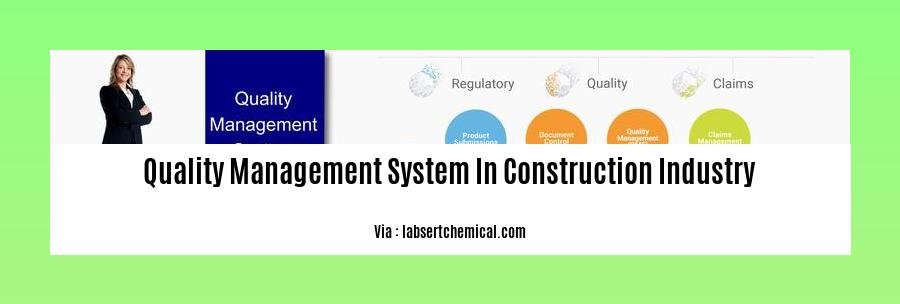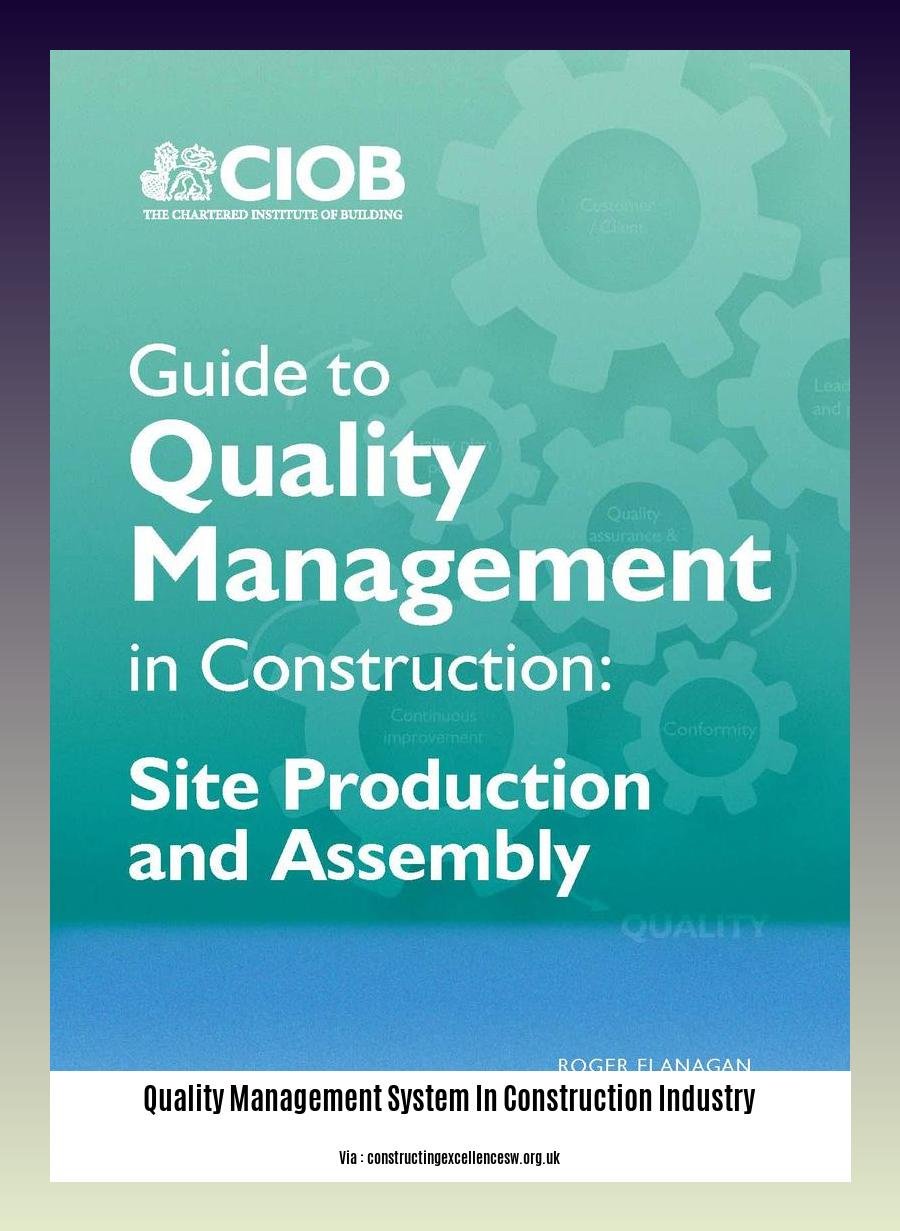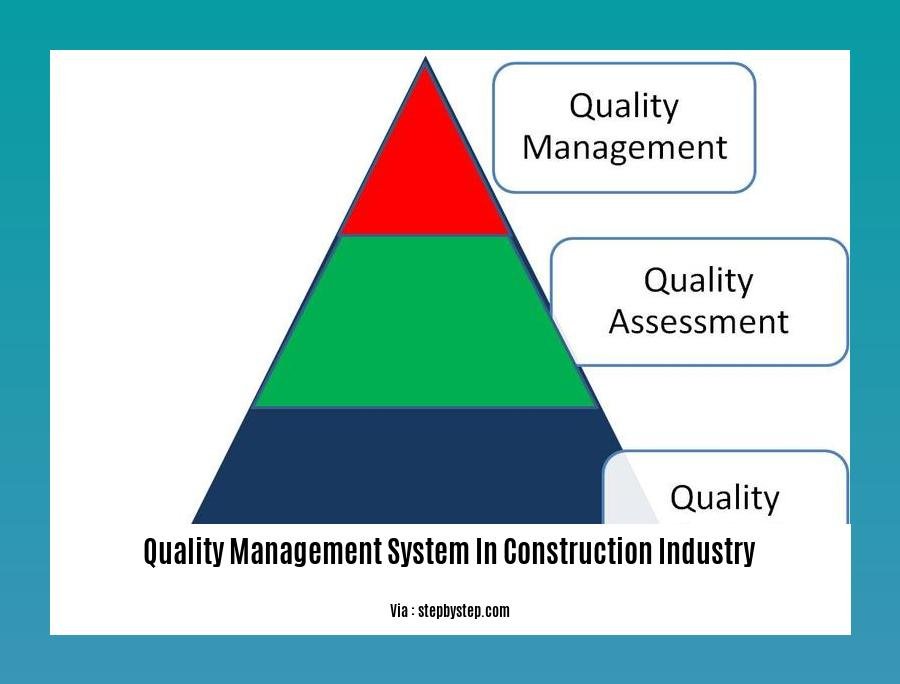Quality Management Systems in Construction: Driving Continuous Improvement. Quality management is paramount in construction, as it ensures that projects are delivered to the required standards, maximizing safety, efficiency, and customer satisfaction. This article will delve into the significance of quality management in construction, providing guidelines, best practices, and essential steps for implementing robust Quality Management Systems (QMS) to drive continuous improvement.
Key Takeaways:
- Ensure adherence to project specifications, materials quality, and workmanship.
- Focus on processes rather than solely on outcomes.
- Prioritize quality, flexibility, and services over cost-cutting.
- Adopt a more collaborative and inclusive organizational structure.
- Emphasize continuous improvement based on data-driven decisions.
Quality Management Systems in Construction Industry

A quality management system (QMS) is a framework that helps construction companies ensure the quality of their products and services. By implementing a QMS, construction companies can improve their efficiency, reduce costs, and increase customer satisfaction.
Benefits of a QMS in Construction
There are many benefits to implementing a QMS in the construction industry, including:
- Improved quality of products and services
- Reduced costs
- Increased customer satisfaction
- Improved efficiency
- Enhanced reputation
How to Implement a QMS in Construction
Implementing a QMS in construction can be a complex process, but it is important to take the time to do it right. The following steps can help you get started:
- Define your quality objectives. What are you trying to achieve with your QMS?
- Develop a quality policy. This document should outline your company’s commitment to quality.
- Create quality procedures. These procedures should describe how your company will meet its quality objectives.
- Train your employees on the QMS. It is important that everyone in your company understands the QMS and how to follow it.
- Implement the QMS. Once you have trained your employees, you can begin implementing the QMS.
- Monitor and evaluate the QMS. It is important to monitor and evaluate your QMS to ensure that it is effective.
Conclusion
A QMS can be a valuable tool for construction companies. By implementing a QMS, construction companies can improve their quality, reduce costs, and increase customer satisfaction.
- To ensure the highest levels of quality and safety, construction companies must implement a quality policy.
- Adhering to quality standards in construction is essential for delivering projects that meet client expectations and industry regulations.
- The construction industry relies heavily on quality standards to ensure the safety, durability, and functionality of buildings and infrastructure.
- Implementing a quality management system in construction enables construction companies to consistently deliver high-quality projects while improving efficiency and reducing risks.
Quality Management Systems (QMS) in Construction: A Guide for Professionals

When upholding the integrity of construction projects, [Q] plays a pivotal role. A well-structured [Q] streamlines processes, ensures adherence to standards, and ultimately delivers superior project outcomes. This comprehensive guide delves into the intricacies of [Q] in the construction industry, empowering professionals to establish robust systems that drive continuous improvement.
Key Takeaways:
- [Q] encompasses quality planning, [Q] control, cost management, and risk minimization.
- Implementing [Q] at the company or project level fosters collaboration and ownership.
- Systematic quality reporting and analysis facilitate informed decision-making and improvement initiatives.
Components of a Robust QMS
- Quality Planning: Defining clear roles, responsibilities, processes, and quality goals to proactively address potential issues.
- Quality Control: Monitoring and controlling quality during construction to detect and resolve nonconformances promptly.
- Cost Management: Integrating quality considerations into project budgeting and cost analysis to optimize resources.
- Risk Management: Identifying, evaluating, and mitigating potential risks to ensure project success and quality objectives.
Benefits of Implementing a QMS
- Enhanced project quality and customer satisfaction
- Improved efficiency and productivity
- Minimized rework and cost overruns
- Increased profitability and competitiveness
- Compliance with industry standards and regulations
Implementing a QMS in Construction
- Establish a Quality Policy: Define the organization’s commitment to quality, outlining goals, objectives, and key performance indicators (KPIs).
- Develop Quality Plans: Create tailored quality plans for each project, specifying quality objectives, processes, and inspection procedures.
- Train and Empower Teams: Equip teams with the knowledge and skills necessary to implement and maintain [Q] effectively.
- Monitor and Control Quality: Conduct regular quality checks, audits, and reviews to ensure compliance and identify areas for improvement.
- Continuously Improve: Foster a culture of continuous improvement by regularly evaluating [Q] processes and implementing necessary enhancements.
Conclusion
Implementing a comprehensive [Q] in construction is essential for achieving卓越 project outcomes. By adhering to industry best practices, leveraging technology, and fostering collaboration, professionals can establish robust systems that drive continuous improvement, enhance project quality, and ultimately deliver exceptional results.
URL Sources
- Application of Quality Management Systems (QMS) in Construction
- [Quality Management in Construction: Here’s What You Need to Know](
Quality Management Systems in Construction: Driving Continuous Improvement
Quality Management Systems (QMS) are essential for construction projects to ensure compliance, improve productivity, and enhance customer satisfaction. As construction professionals, we strive to implement and maintain robust QMS that provide a framework for continuous improvement.
Developing a Comprehensive QMS
The foundation of a successful QMS lies in its development. This involves:
- Establishing a quality policy that aligns with organizational values and project goals.
- Creating project-specific quality plans that outline roles, responsibilities, and quality standards.
- Training and empowering teams to understand QMS principles and their implementation.
Quality Control and Improvement
Maintaining quality throughout construction requires effective monitoring and control measures. This process includes:
- Regularly inspecting materials and workmanship to ensure adherence to specifications.
- Identifying and promptly resolving nonconformances through corrective and preventive actions.
- Implementing a systematic reporting system that facilitates data analysis and continuous improvement initiatives.
Cost Management and Risk Mitigation
QMS encompasses not only quality control but also cost management and risk mitigation. By integrating these aspects, we can:
- Optimize resource allocation through quality considerations.
- Identify potential risks and develop mitigation strategies to minimize their impact on project delivery.
- Establish contingency plans to respond effectively to unforeseen circumstances.
Key Takeaways:
- QMS provides a structured approach to ensure project quality, improve efficiency, and reduce costs.
- Developing and implementing a comprehensive QMS requires collaboration, training, and effective monitoring.
- Continuous improvement is an integral aspect of QMS, driven by data analysis and feedback from all stakeholders.
- QMS enhances customer satisfaction by delivering projects that meet or exceed expectations.
Citations:
- Construction Quality Management System (QMS)
- Application of Quality Management Systems (QMS) in Construction
Driving Continuous Improvement with Quality Management Systems in Construction
Managing quality in construction is essential for ensuring project success. Implementing effective Quality Management Systems (QMS) is key to driving continuous improvement and delivering projects that meet expectations.
Quality Planning and Assurance
a comprehensive quality plan ensures clear roles, responsibilities, and standards throughout the project. Quality assurance processes monitor and inspect materials and workmanship, ensuring compliance and identifying nonconformances for prompt resolution.
Quality Control and Improvement
a robust quality control system monitors and controls quality throughout the construction process. Nonconformances are identified and addressed through corrective actions, and preventive measures are implemented to avoid recurrence. Continuous improvement is driven by data analysis and ongoing feedback.
Cost Management and Risk Mitigation
a well-integrated QMS incorporates cost management and risk mitigation. Quality considerations are factored into resource allocation, and risks are proactively identified and mitigated. This approach optimizes project outcomes and reduces the likelihood of costly rework and delays.
Key Takeaways:
- a QMS provides a structured framework for quality assurance, efficiency improvement, and cost reduction.
- a QMS requires collaboration, training, and effective monitoring.
- Continuous improvement is driven by a data analysis and collaboration.
- a QMS enhances customer satisfaction by ensuring projects meet expectations.
Relevant URL Sources:
- Application of Quality Management Systems (QMS) in Construction
- Quality Management in Construction: Here’s What You Need to Know
FAQ
Q1: What are the key components of a Quality Management System (QMS) in construction?
A1: QMS in construction typically encompasses quality planning, assurance, control, cost, and risk management.
Q2: Why is quality management important in the construction industry?
A2: QMS helps ensure project specifications are met, improves efficiency and productivity, reduces costs and waste, and enhances customer satisfaction and loyalty.
Q3: What are some challenges to implementing a QMS in construction?
A3: Challenges can include the size and complexity of construction projects, the variety of stakeholders involved, resistance to change, and lack of awareness and understanding of QMS principles and best practices.
Q4: What are some best practices for implementing a QMS in construction?
A4: Best practices include involving all stakeholders, providing training and support, using standardized processes and documentation, and continuously monitoring and improving the system.
Q5: What are the benefits of using a QMS in construction projects?
A5: QMS can improve project quality, reduce costs and waste, enhance customer satisfaction, and increase competitive advantage.
- Greenhouse Storage Shed Combos: Your Guide to Combining Growing and Storage - April 21, 2025
- Greenhouse Shed Combo: Design, Build & Grow Year-Round - April 21, 2025
- Gingham vs. Plaid: What’s the Difference? A Complete Guide - April 21, 2025










